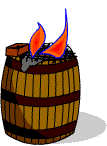Burn Barrels
Created | Updated Jan 28, 2002

Ever since the ecology movement of the 1960s and 1970s, the United States has had a peculiar relationship with its garbage. That great anthropomorphism, The Public became convinced that there was too much waste, that something had to be done, and in some places it was. Recycling has become the name of the game, and in any major city these days, you'll find people striving to reuse, reduce, and recycle.
In places like Seattle, San Francisco, and New York, sorting your garbage into approved categories has become a major preoccupation of the young liberal set, and the rules for doing so have become ever more baroque and Kafkaesque.
Things are different if you take a journey out of the big cities. Start in Seattle and head east. At Spokane, take a turn right and go south into the wheat country of the Palouse. Pick a country road and follow it for a while, far beyond the cities and even the towns. Pull up in the driveway of a random farm, say hi to the dogs and stray cats. Look around. You'll find that rebellious little secret of American rural life: the burn barrel.
There are no garbage trucks out there. There are no neighbours keeping an eye on you making sure your garbage is sorted in the politically correct manner, either. The dump charges a fee, and it galls the independent frontier spirit to pay for something you're getting rid of. So, the choice is clear: if you can't eat it, reuse it, turn it into a planter or feed it to the goats, you burn it.
A burn barrel is an old 55-gallon drum with the top cut off and a few holes poked in the bottom. The drum probably started life holding herbicides or tractor lubricant.
Any rubbish the family produces, goes into the burn barrel. A piece of wire screening on top, held down with a brick, keeps animals out. When the barrel is full, some gasoline is throw on and a match is tossed. Then, leaning against a tree with a beer in your hand, watch your garbage get disposed of the easy way: into ashes and smoke.
When the barrel fills up with ash, they're dumped and forgotten about.

